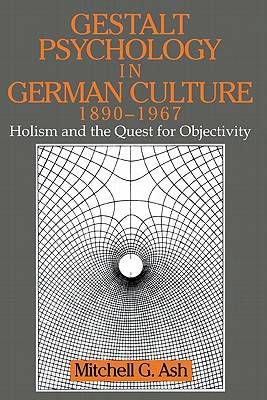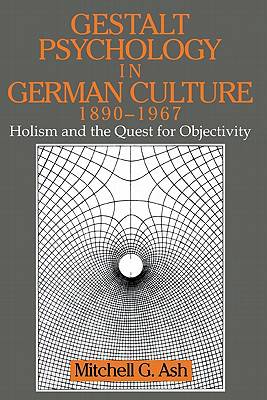
- Afhalen na 1 uur in een winkel met voorraad
- Gratis thuislevering in België vanaf € 30
- Ruim aanbod met 7 miljoen producten
- Afhalen na 1 uur in een winkel met voorraad
- Gratis thuislevering in België vanaf € 30
- Ruim aanbod met 7 miljoen producten
Zoeken
Gestalt Psychology in German Culture, 1890 1967
Holism and the Quest for Objectivity
Mitchell G. (University of Iowa and Universitat Wien, Austria) A
€ 223,45
+ 446 punten
Omschrijving
This is the first full-length historical study of Gestalt psychology--an attempt to advance holistic thought within natural science. Holistic thought is often portrayed as a wooly-minded revolt against reason and modern science, but this is not so. On the basis of rigorous experimental research and scientific argument as well as on philosophical grounds, the Gestalt theorists Max Wertheimer, Wolfgang Köhler and Kurt Koffka opposed conceptions of science and mind that equated knowledge of nature with its effective manipulation and control. Instead, they attempted to establish dynamic principles of inherent, objective order and meaning in current language, principles of self-organization in human perception and thinking, in human and animal behavior, and in the physical world. The impact of their work ranged from cognitive science to theoretical biology and film theory. Based on exhaustive research in primary sources, including archival material cited here for the first time, this study illuminates the multiple social and intellectual contexts of Gestalt theory and analyzes the emergence, development and reception of its conceptual foundations and research programs from 1890 to 1967.
Specificaties
Betrokkenen
- Auteur(s):
- Uitgeverij:
Inhoud
- Aantal bladzijden:
- 528
- Taal:
- Engels
- Reeks:
Eigenschappen
- Productcode (EAN):
- 9780521475402
- Verschijningsdatum:
- 26/01/1996
- Uitvoering:
- Hardcover
- Formaat:
- Genaaid
- Afmetingen:
- 159 mm x 234 mm
- Gewicht:
- 771 g

Alleen bij Standaard Boekhandel
+ 446 punten op je klantenkaart van Standaard Boekhandel
Beoordelingen
We publiceren alleen reviews die voldoen aan de voorwaarden voor reviews. Bekijk onze voorwaarden voor reviews.











